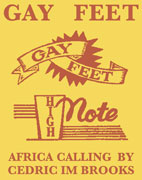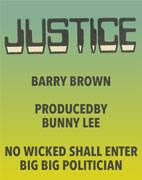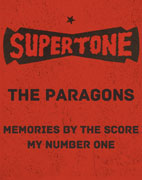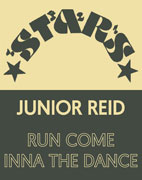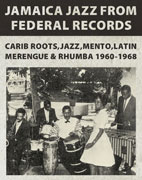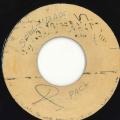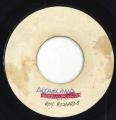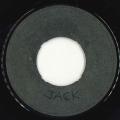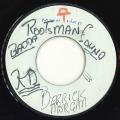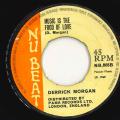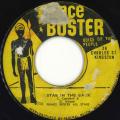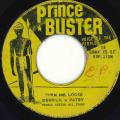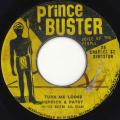Derrick MorganText by Harry Hawks
The personification and epitome of musical and sartorial cool Derrick Morgan's story recounts the growth of Jamaican music into the phenomenon that took the world by storm in the mid-seventies.
Derrick Morgan
| Born | Mar 27, 1940 |
| Place of Birth | Clarendon Jamaica |
| Related Artist(s) |
In 1957 Derrick "came first" with his Little Richard impressions singing 'Long Tall Sally' and 'Jenny Jenny' for his debut appearance on Vere Johns Junior's Opportunity Hour. He was immediately enlisted by Jamaica's top comedy duo, Bim And Bam, as their singer. They renamed him Little Richie and Derrick toured "all the theatres in Jamaica" doing stage shows and "when Bim and Bam fell out I used to act as Bam". It appears that no-one was ever any the wiser. Derrick stayed with Bim and Bam for two years until "I hear Duke Reid was taking auditions so I went to him to do some recording". He recorded two songs for Duke Reid, 'Oh My' and 'Lover Boy', but Duke kept them as exclusives and only played them on acetate, or reference disc, on his Treasure Isle Time radio show and sound system. "He wouldn't release them until I recorded for Little Wonder. My first actual release was 'Fat Man' on their Smith's label". This samba based song was a huge hit and afterwards "I record about six songs Duke demand me back so I started recording for him with Millicent Todd as Derrick & Patsy".
"Then I met Prince Buster and we get together and I started to record for Buster" and their work together established Derrick Morgan as Jamaica's most popular performer. "Prince Buster and I were good friends until I left him for Beverleys" (owned by Chinese Jamaican Leslie Kong) "and after 'Forward March' in 1962 he write a song about me called 'Black Head China Man'".
"Derrick Morgan and Prince Buster had that confrontation on record when Buster did a tune 'They Got To Come' and then Derrick did one named 'Forward March' for Beverleys. Well the solo in 'Forward March' was near but if you listen properly it's two different solos. Prince Buster was vexed and he said Derrick had stolen his solo and used it for the Beverleys tune. Leslie Kong was Chinese and Buster sang:
'You done stole my belongings and give to your chiney man
God in heaven knows, he knows, that you are wrong
Are you a chinaman?
Are you a blackman?
It don't need no eyeglasses to see that your skin is black...'
Prince Buster: 'Black Head Chinaman'
And then Derrick answered with 'The Blazing Fire' which he introduced in the Chinese language and then sung 'Be still and know I'm your superior' so they had quite a carrying on but that rivalry thing helped to sell records too for quite a while!" Bunny Striker Lee
Derrick explained that the "belongings" that Buster accused Derrick of stealing from him were actually the horn players 'Deadly' Headley Bennett and Lester Sterling who had blown the solos in 'Forward March' and "that's what caused the disruption."
Prince Buster brought Emil E. Shalit, owner of the London based Blue Beat label, to Jamaica in 1963. By licensing the latest and greatest Jamaican records for release in the UK his Blue Beat had done a great deal to popularise Jamaican music outside of its immediate expatriate audience. When Emil returned home Derrick accompanied him to London but "I didn't like the weather" and after six months Derrick went back to Kingston where he immediately recorded a song called 'Poison Ivy' for Prince Buster. While Derrick was "in foreign" Stranger Cole had "stolen Patsy" and so Derrick worked with his cousin Yvonne and recorded 'Meekly Wait' as Derrick and Yvonne for The President label.
Derrick had signed a contract with Emil E. Shalit to record only for producers with contracts with his Blue Beat label. Leslie Kong's Beverleys records were released in London on Chris Blackwell's Island label and, consequently, Leslie Kong would not employ Derrick. It required the intervention of then Minister for Finance, Edward Seaga who wrote to Emil E. Shalit in London in 1965, asking for Derrick to be released from the contract before Derrick was able to work with Beverleys again. Derrick had been recording with Clement 'Coxsone' Dodd(CS Dodd) at Studio One as Derrick Morgan And The Blues Blenders but "all the time I wanted to go back to Leslie Kong because he was the best payer". Derrick not only sang but also arranged, rehearsed, produced and ran auditions for Beverleys.
"Derrick Morgan was a singer but he also selected the artists for Beverleys. You'd come to see him and he played the piano and listened to you. If he liked your song you'd come to the studio and they'd record it. That was Derrick's job away from singing. I used to go to the studio with Derrick a lot and he used to rehearse singers like Desmond Dekker, George Dekker... you name them. Derrick was the man at Beverleys.
Bob Marley was just starting out at those times and, as you know, Derrick Morgan had a very, very strong influence on Jamaican music. We call him the king of ska because when he was at Beverley's Records he discovered Bob Marley, Desmond Dekker, and even The Maytals. He turned The Maytals down once and then he admitted that he'd made a mistake and they went back and worked together. Heh, heh, heh... it shows anybody can make a mistake. We still laugh about it. He said Toots sounded too much like a pocomania singer!" Bunny Striker Lee
His Beverleys sessions had established Derrick Morgan as a producer in his own right and, as Jamaican music moved on from ska to rock steady, he started his own Hop label "because everybody want to try and push out for themselves". "Rock steady was a great change from the ska" and Derrick's Hop label employed the legendary Lyn Taitt & The Jets whose wholly original sound defined rock steady music. Derrick was not slow to acknowledge this formidable musician's contribution: "He's the man who changed Jamaican music right round from ska to rock steady". The inaugural release on the Hop label (also released on the Derrick Morgan label) was a massive hit "The first song I released was 'Red Bumb Ball' by Lloyd & Devon. It was a big seller and it encouraged me to go on and do more". The bass line from 'Red Bumb Ball' would eventually become one of Jamaican music's most versioned rhythm tracks ever and Derrick explained what a 'bumb ball' actually was: "A red bomb ball was a ball, like a playing ball, a ball that can bomb up in the air." Derrick and Lyn worked closely together on all the Hop recordings from and1966 to 1968: "Most time Lyn Taitt set the bass line but the break in the singing I'd be arranging it".
In 1969 Derrick once again moved to England where he joined the Palmer Brothers in London and started to produce records for their Pama organisation: "I used to control their label called Crab. They get a lot of hit songs off of me and 'Moon Hop' and 'Seven Letters' even got into the UK National Chart but I'm not recognised as a producer. I did a lot of productions for Bunny Lee but my name is not mentioned. 'Wet Dream' used my 'Hold You Jack' rhythm but that's nothing. The talent is always with me! Even with Duke Reid a lot of the times I used to guide the artists and musicians how to go into it". Unfortunately Derrick's stirring 'Moon Hop' only troubled the lower reaches of the UK National Charts but the record would have been a serious smash had it not been for The Pyramids' (as Symarip) cover version for Pama's arch rival, Trojan Records, which they renamed 'Skinhead Moon Stomp'.
Derrick returned to Jamaica in 1970 and his update of 'Fat Man' for Lynford 'Andy Capp' Anderson helped to form the basis of the dub music revolution when Andy Capp unleashed chapter and verse of the 'Pop A Top' saga. Derrick also recorded a number of heavyweight hits for Hop which reflected another direction, roots and culture, that reggae music was then moving towards including 'Let The Power Fall On I' by Max Romeo.
He "used to come and go right up until 1975" when Derrick moved to Canada and did "some recording". In 1979 he moved to America where he remained for ten years. Derrick did not return to the UK until 1989. His next musical move was making the decision to "go back to the vintage thing" and his first appearance as a veteran was at London's Shady Grove club where "the man decide to give me a show". The club was "rammed by nine o'clock! I'm proud to say that I started getting oldies shows going and now everyone's doing it... even people with walking sticks!" and Derrick has established himself as a firm favourite on reggae's 'revival' circuit.
"Derrick Morgan still has it. Every show he goes on he steals it! Yes... One time when he was in America they used Derrick to open a show for Black Uhuru and when Derrick was done everybody came out of the place! Any time Derrick goes anywhere they always like Derrick! But they have to sing before Derrick Morgan..." Bunny Striker Lee
Most historical accounts are driven by revisionism of one type or another and, even when events have occurred within living memory, the facts can still be radically altered to fit with current thinking. At times it can seem as if a bout of collective amnesia has occurred when it comes to the reputation of men like Derrick Morgan. Throughout the history of Jamaican music only a very select few could hope to approach his popularity as a singer and his lengthy roll call of hit records but his behind the scenes work as a producer and arranger is every bit as important and influential. Respect is long overdue for this founding father of Jamaican music.
Sources:
Noel Hawks: Interview with Derrick Morgan London/Kingston 17th July 2003
Noel Hawks & Jah Floyd: Reggae Going International 1967 to 1976 The Bunny 'Striker' Lee' Story Jamaican Recordings Publishing 2012
Date Added: Jan 24, 2018
Copyright (C) 2024 Dub Store Sound Inc.
Related Item(s)
| Roy Richards - Dream Land(Coxsone-Pre)VG-/SEW/WOL/SLD B:stamp |
B side) Derrick Morgan - Cool Off Rudie
| Inventors - Music Is The Food Of Love(Nu Beat UK)EX/NOC B:LD/WOL |
B side) Derrick Morgan, Patsy - Hey Boy Hey Girl
B side) Derrick Morgan - Coconut Tree
| Derrick Morgan, Patsy - Turn Me Loose(Prince Buster V. O. P)VG-/SEW/WOL/LD |
B side) Derrick Morgan - Coconut Tree











